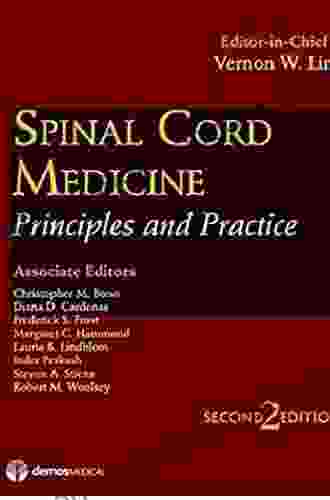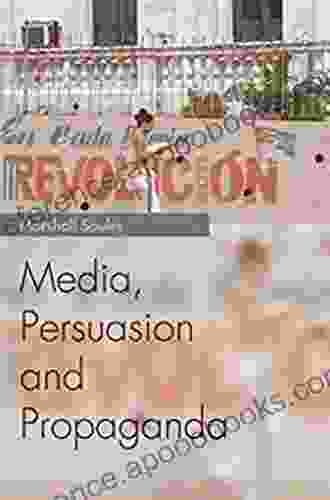Unveiling the Art of Persuasion and Propaganda: A Comprehensive Guide to Media Manipulation

In the realm of communication, the power to persuade and influence holds immense significance. Media, in its various forms, serves as a potent tool for shaping public opinion and driving societal change. However, alongside its transformative potential, media also carries the capacity for manipulation and propaganda, raising concerns about its ethical and societal implications.
4.2 out of 5
| Language | : | English |
| File size | : | 3277 KB |
| Text-to-Speech | : | Enabled |
| Screen Reader | : | Supported |
| Enhanced typesetting | : | Enabled |
| Print length | : | 288 pages |
| X-Ray for textbooks | : | Enabled |
Historical Roots of Persuasion and Propaganda
The roots of persuasion and propaganda can be traced back to ancient times, with notable figures such as Aristotle and Plato recognizing the influence of rhetoric in shaping public discourse. Over the centuries, various techniques and strategies have emerged, each designed to sway hearts and minds.
In the modern era, the advent of mass media ushered in a new era of persuasion and propaganda. The ability to reach vast audiences through print, radio, television, and now the internet has amplified the impact of these persuasive techniques, giving rise to both legitimate and questionable practices.
Methods of Media Persuasion
Advertisers, marketers, and political campaigns employ a wide range of tactics to persuade their target audiences. These methods include:
- Emotional Appeals: Tapping into emotions, such as fear, desire, or nostalgia, can be a powerful way to influence behavior.
- Logical Arguments: Presenting rational arguments and evidence can also be effective in swaying opinions, particularly among audiences that value logical reasoning.
- Social Proof: Demonstrating that a particular belief or behavior is widely accepted can encourage individuals to conform to group norms.
- Repetition: Repeating a message multiple times can increase its memorability and perceived validity.
- Framing: Presenting information in a particular way can shape how people perceive and interpret it, influencing their attitudes and behaviors.
Propaganda: A Tool for Manipulation
Propaganda differs from persuasion in its intent and methods. While persuasion aims to influence opinions and behaviors through legitimate means, propaganda seeks to manipulate and control public opinion, often using deceptive or unethical tactics.
Common propaganda techniques include:
- Name-calling: Labeling individuals or groups with negative or derogatory terms to discredit them.
- Glittering Generalities: Using vague and emotionally appealing language to create positive associations without providing specific details or evidence.
- Transfer: Associating a person, product, or idea with something that is highly valued or admired to gain credibility.
- Testimonial: Using endorsements from respected individuals or organizations to lend credibility to a message.
- Fear-Mongering: Exaggerating threats or dangers to create a sense of urgency and encourage support for a particular agenda.
Ethical Concerns and Societal Impact
The widespread use of persuasion and propaganda raises ethical concerns and has significant implications for society. Excessive reliance on emotional appeals and manipulation can undermine critical thinking and informed decision-making.
Propaganda, in particular, can be used to spread misinformation, sow division, and suppress dissent. It can undermine democratic principles and destabilize societies by eroding trust in institutions and creating a climate of fear and mistrust.
Critical Thinking and Media Literacy
To mitigate the potential negative effects of media persuasion and propaganda, it is essential to foster critical thinking and media literacy skills among the public. By equipping individuals with the ability to analyze and evaluate media messages, we can empower them to make informed decisions and resist manipulation.
Educating people about the techniques of persuasion and propaganda can help them identify and resist deceptive or manipulative messages. Critical thinking skills allow individuals to question the motives and evidence behind claims, evaluate the reliability of sources, and recognize biases in information.
Media persuasion and propaganda are powerful forces that can shape our thoughts, beliefs, and actions. Understanding the methods, motivations, and ethical implications of these techniques is crucial for navigating the complex media landscape and making informed decisions in a world saturated with information.
By embracing critical thinking and media literacy, we can empower ourselves to resist manipulation and harness the transformative potential of media for positive change and societal progress.
4.2 out of 5
| Language | : | English |
| File size | : | 3277 KB |
| Text-to-Speech | : | Enabled |
| Screen Reader | : | Supported |
| Enhanced typesetting | : | Enabled |
| Print length | : | 288 pages |
| X-Ray for textbooks | : | Enabled |
Do you want to contribute by writing guest posts on this blog?
Please contact us and send us a resume of previous articles that you have written.
 Book
Book Novel
Novel Page
Page Chapter
Chapter Text
Text Story
Story Genre
Genre Reader
Reader Library
Library Paperback
Paperback E-book
E-book Magazine
Magazine Newspaper
Newspaper Paragraph
Paragraph Sentence
Sentence Bookmark
Bookmark Shelf
Shelf Glossary
Glossary Bibliography
Bibliography Foreword
Foreword Preface
Preface Synopsis
Synopsis Annotation
Annotation Footnote
Footnote Manuscript
Manuscript Scroll
Scroll Codex
Codex Tome
Tome Bestseller
Bestseller Classics
Classics Library card
Library card Narrative
Narrative Biography
Biography Autobiography
Autobiography Memoir
Memoir Reference
Reference Encyclopedia
Encyclopedia Mary Scott Huff
Mary Scott Huff A M Caplan
A M Caplan Elena Collins
Elena Collins Aaron Bushkowsky
Aaron Bushkowsky John Perazzo
John Perazzo Adjauni
Adjauni Drea Bauer
Drea Bauer Kay Bratt
Kay Bratt Adam Oyebanji
Adam Oyebanji Thomas Lux
Thomas Lux Maureen Murdock
Maureen Murdock A M N Goldman
A M N Goldman David Karpf
David Karpf Steve Belkin
Steve Belkin Samara Klar
Samara Klar Arsenio Frugoni
Arsenio Frugoni Jamie Aramini
Jamie Aramini S Lakshmi Tiruvenkadu
S Lakshmi Tiruvenkadu A L Lester
A L Lester Joe Schreiber
Joe Schreiber
Light bulbAdvertise smarter! Our strategic ad space ensures maximum exposure. Reserve your spot today!

 Jake CarterJourney Through the Cosmic Absurdities of Humorous Science Fiction: Unveiling...
Jake CarterJourney Through the Cosmic Absurdities of Humorous Science Fiction: Unveiling...
 Franklin BellFrom De-Stalinization to Perestroika: A Captivating Journey Through Modern...
Franklin BellFrom De-Stalinization to Perestroika: A Captivating Journey Through Modern...
 Gene PowellEmbark on a Journey to the Realm of Magic and Chivalry with "Sir Gawain and...
Gene PowellEmbark on a Journey to the Realm of Magic and Chivalry with "Sir Gawain and... Branson CarterFollow ·2.5k
Branson CarterFollow ·2.5k Leo MitchellFollow ·13.1k
Leo MitchellFollow ·13.1k Gustavo CoxFollow ·15.8k
Gustavo CoxFollow ·15.8k Eddie PowellFollow ·7.6k
Eddie PowellFollow ·7.6k Graham BlairFollow ·12.1k
Graham BlairFollow ·12.1k Joseph FosterFollow ·7.1k
Joseph FosterFollow ·7.1k John GreenFollow ·14.2k
John GreenFollow ·14.2k Douglas AdamsFollow ·12.8k
Douglas AdamsFollow ·12.8k

 Justin Bell
Justin BellUnlock National Biology Success: The Ultimate Guide to...
Mastering the Fundamentals: A Comprehensive...
 Luke Blair
Luke BlairAC/DC: The Early Years with Bon Scott – A Thunderstruck...
In the annals of rock and roll history, few...

 Darren Nelson
Darren NelsonSpinal Cord Medicine Second Edition: The Comprehensive...
The second edition of Spinal Cord Medicine...

 Cole Powell
Cole PowellArabian Horse Training: Unlock the Secrets for a...
Indulge in the captivating world of Arabian...

 Oscar Wilde
Oscar WildeRevise Curriculum For Excellence SQA Exams: The Ultimate...
The Scottish...

 David Peterson
David PetersonEndoscopic Ear Surgery: A Comprehensive Guide for...
Endoscopic Ear...
4.2 out of 5
| Language | : | English |
| File size | : | 3277 KB |
| Text-to-Speech | : | Enabled |
| Screen Reader | : | Supported |
| Enhanced typesetting | : | Enabled |
| Print length | : | 288 pages |
| X-Ray for textbooks | : | Enabled |






